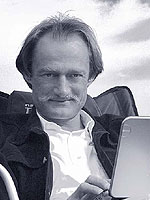Alois Ferscha, University of Linz
Alois Ferscha received the Mag. degree in 1984, and a PhD in business informatics in 1990, both from the University of Vienna, Austria. From 1986 through 2000 he was with the Department of Applied Computer Science at the University of Vienna at the levels of assistant and associate professor. In 2000 he joined the University of Linz as full professor. Prof. Ferscha has published more than 60 technical papers on topics related to parallel and distributed computing, like e.g. Computer Aided Parallel Software Engineering, Performance Oriented Distributed/Parallel Program Development, Parallel and Distributed Discrete Event Simulation, Performance Modeling/Analysis of Parallel Systems and Parallel Visual Programming. Currently he is focussed on Pervasive Computing, Embedded Software Systems, Wireless Communication, Multiuser Cooperation, Distributed Interaction and Distributed Interactive Simulation. He has been the project leader of several national and international research projects like e.g.: Network Computing, Performance Analysis of Parallel Systems and their Workload, Parallel Simulation of Very Large Office Workflow Models, Distributed Simulation on High Performance Parallel Computer Architectures, Modelling and Analysis of Time Constrained and Hierarchical Systems (MATCH, HCM), Broadband Integrated Satellite Network Traffic Evaluation (BISANTE, ESPRIT IV) and Distributed Cooperative Environments (COOPERATE) and Virtual Enterprises. Currently he is pursuing project work related to context based application frameworks in a "Wireless Campus" network, public communication displays with wireless remote controls, geo-enhanced mobile navigation systems, RFID based realtime notification systems, wearable computing and embedded internet application frameworks. He has been a visiting researcher at the Dipartimento di Informatica, Universita di Torino, Italy, at the Dipartimento di Informatica, Universita di Genoa, Italy, at the Computer Science Department, University of Maryland at College Park, College Park, Maryland, U.S.A., and at the Department of Computer and Information Sciences, University of Oregon, Eugene, Oregon, U.S.A. He has served on the committees of several conferences like WWW, PADS, DIS-RT, SIGMETRICS, MASCOTS, TOOLS, PNPM, ICS, and was programe committee chair of PADS'98, MASCOTS'99, co-chair of the Pervasive Computing Workshop at Informatik 2001 and vice-chair of WWW2002. Prof. Ferscha is member of the GI, ACM and IEEE and holds the Heinz-Zemanek Award for distinguished contributions in computer science. |
Presentation: "Contextware: Implementing the Pervasive Computing Landscape"
Track:
Pervasive Computing
Time: Wednesday 14:15 - 15:15 Location: Nortvegia
Abstract:
Most recent advances in microprocessor-, wireless communication- and sensor-/actuator technologies envision a whole new era of computing, popularly referred to as "pervasive" or "ubiquitous" computing. Autonomous, ad-hoc networked, wirelessly communicating and spontaneously interacting computing devices appearing in great number, and embedded into environments, appliances and objects of everyday use will deliver services adapted to the person, the time, the place - or most generally: the context - of their use. The nature and appearance of computing devices will change to be hidden in the fabric of everyday life, invisible networked, and will be augmenting everyday environments to form a perva-sive computing landscape, in which the physical world becomes merged with a "digital world". In an analogy to the term middleware, I will introduce the term "contextware" as the core of software technologies mediating services and the context of their use. In this presentation I will explore the software engineering issues, challenges and enabling technologies associated with the provision of context aware services able to describe, gather, transform, interpret and disseminate context information within adhoc, highly dy-namic and frequently changing computing environments. Approaches to dynamically dis-cover, inspect, compose and aggregate software components in order to identify, control and extend context, as well as overcome context barriers (like time, position, user prefer-ence, etc.) will be discussed, and means to allow for dynamic interactions among software components in a scalable fashion and integrating heterogeneous computing environments and devices with different functionality, ability, form factor, size and limited resources wrt. processing power, memory size, communication, I/O capabilities, etc. will be analyzed. I will present some of the design issues of the SiLiCon contextware framework, and demon-strate applications that have been built on top of it. Presentation: "Panel Pervasive"
Track:
Pervasive Computing
Time: Wednesday 16:45 - 17:30 Location: Nortvegia |
|
|










